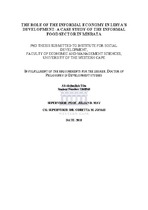| dc.description.abstract | In society, development had hitherto been mainly defined in relation to the pursuit and
sustenance of balanced economic growth. Since the new millennium however, the essence of
development has increasingly shifted beyond minimalist economic definitions, to include a
balanced incorporation of social welfare focusing on core areas like health and education, and
other issues like environmental sustainability. Also, linkages have been established between
both aspects, such that for all countries, developed or developing, the success of economic
policies is often influenced by and/or linked to the extent of social development. Still, priorities
differ between developed and developing countries. While developed countries are more
concerned with issues of global peace and national security, most developing countries focus
on poverty eradication, job creation, universal access to quality education and improved health
services.
Libya’s vibrant informal economy has the potential to contribute to the country’s economic
and national development efforts. The informal food sector, which is a part of the informal
economy, can play an important role in this. Not only does the sector provide food to the poor
at affordable prices, it also creates employment and business opportunities for a large number
of people who otherwise would find it difficult to find employment, earn a living and secure
theirs and their family’s livelihoods through income generated within the sector. Despite this,
very few studies have been conducted to explore the nature and potential of the sector. | |

